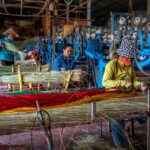Table of Contents
- 1. A Monumental Leap Forward for the Manitoba Provincial Nominee Program (MPNP)
- 2. Decoding the Impact: What the Enhanced 2025 Immigration Allocation Means for Hopefuls
- 3. Pivotal Industries: Manitoba’s Priority Sectors for the Expanded Immigration Intake
- 4. Navigating the Major MPNP Streams: A Strategic Overview for Applicants
- 5. Frequently Asked Questions (FAQs)
Manitoba is set for a landmark year in immigration, having successfully secured a substantial increase in its provincial nomination allocation for 2025 from the federal government. This pivotal development signals a renewed commitment to welcoming skilled workers, entrepreneurs, and international graduates to the Keystone Province. For prospective immigrants worldwide, this announcement represents a significant expansion of opportunities, making Manitoba an even more attractive destination for those seeking to build a new life in Canada. This enhanced allocation is a direct response to the province’s robust economic growth and burgeoning labour market demands, ensuring that Manitoba remains competitive and continues to thrive by filling critical skills gaps with talented newcomers.
A Monumental Leap Forward for the Manitoba Provincial Nominee Program (MPNP)
The Manitoba Provincial Nominee Program (MPNP) has long been celebrated as one of Canada’s most established and successful immigration pathways, pioneering the provincial-federal partnership model since its inception in 1998. The newly announced Manitoba 2025 immigration allocation marks a truly monumental chapter in its history. Provincial officials have confirmed that the federal government, through Immigration, Refugees and Citizenship Canada (IRCC), has granted Manitoba the capacity to nominate approximately 9,500 individuals for permanent residence in 2025. This figure represents a considerable increase from previous years and underscores the federal government’s confidence in Manitoba’s ability to successfully select, welcome, and integrate newcomers into its communities and workforce. This strategic enhancement is not a mere statistical adjustment; it is the culmination of extensive negotiations and data-driven advocacy from the provincial government, which effectively demonstrated the urgent need for more skilled individuals to fuel its expanding economy.
This increased capacity empowers the MPNP to be more responsive and dynamic in its approach to immigration. It allows the program to issue a greater number of Letters of Advice to Apply (LAAs) through its regular Expression of Interest (EOI) draws. The decision reflects a proactive stance on addressing specific labour shortages that have become more pronounced in the post-pandemic economic recovery. Provincial leaders have highlighted that this boost will be instrumental in supporting key public services like healthcare and education, as well as driving innovation in the technology and manufacturing sectors. For the province, this is a powerful tool for demographic and economic revitalization, ensuring long-term prosperity and cultural enrichment.
Decoding the Impact: What the Enhanced 2025 Immigration Allocation Means for Hopefuls
For individuals and families dreaming of immigrating to Canada, Manitoba’s increased 2025 allocation is exceptionally welcome news. The most direct and significant consequence of a larger allocation is a higher number of invitations. With more nomination spots available, the MPNP can conduct larger and potentially more frequent EOI draws. This expansion of intake capacity naturally increases the chances for a broader range of candidates to receive a coveted Letter of Advice to Apply. While the EOI system remains competitive, a larger pool of available nominations may lead to a stabilization or even a strategic lowering of the minimum point requirements for certain draws, particularly for those targeting specific in-demand occupations. Candidates who may have previously found themselves just below the cutoff score could now find their profiles are competitive enough to be selected.
Furthermore, this development provides a greater degree of predictability and hope for applicants already in the MPNP pool. The increased allocation signifies momentum and a clear pathway forward, reducing uncertainty and wait times. It also allows the program to be more flexible in its selection criteria, potentially opening the door for targeted draws aimed at niche professions or candidates with specific skills that align with emerging economic projects in the province. Essentially, the larger quota transforms the MPNP from a highly restrictive gateway into a more expansive and accessible bridge to Canadian permanent residency. It reinforces the message that Manitoba is not just open to immigration but is actively and enthusiastically seeking newcomers to contribute to its future success.
Pivotal Industries: Manitoba’s Priority Sectors for the Expanded Immigration Intake
The decision to expand the Manitoba PNP allocation was driven by pressing needs within specific sectors of the provincial economy. This targeted approach ensures that the benefits of immigration are channeled directly into areas requiring immediate support and growth. While the program welcomes a diverse range of professionals, several key industries are poised to benefit most from the 2025 increase. The healthcare sector remains a top priority, with a sustained demand for nurses, physicians, medical laboratory technologists, and healthcare aides. The expanded allocation will enable the province to nominate more internationally trained health professionals to bolster its hospitals, clinics, and long-term care facilities. Similarly, the manufacturing and transportation industries, which form the backbone of Manitoba’s economy, are actively seeking skilled tradespeople, machine operators, and long-haul truck drivers to maintain and grow their operations.
Beyond these traditional pillars, Manitoba is also focused on nurturing its burgeoning tech and creative industries. The province is looking to attract software developers, data analysts, cybersecurity experts, and interactive media professionals to its innovation hubs in Winnipeg and other urban centers. The agricultural sector, a perennial powerhouse, will also benefit, with a need for farm managers, agricultural technicians, and food processing workers. This strategic alignment between immigration targets and economic needs ensures that newcomers arrive with in-demand skills, facilitating a smoother transition into the workforce and immediate contributions to the provincial economy.
Key Takeaways: Priority Sectors for Manitoba’s 2025 PNP Increase
- Healthcare: Critical demand for registered nurses, licensed practical nurses, physicians, and other allied health professionals to support public health services.
- Manufacturing: A strong need for welders, industrial mechanics, machinists, and production supervisors to drive the province’s industrial output.
- Transportation and Logistics: High demand for transport truck drivers, supply chain managers, and logistics coordinators to support Manitoba’s role as a central transportation hub.
- Technology and IT: Growing opportunities for software engineers, IT project managers, business systems analysts, and cybersecurity specialists.
- Agriculture and Agri-food: Continuous need for skilled workers in primary agriculture, food processing, and agricultural technology.
Navigating the Major MPNP Streams: A Strategic Overview for Applicants
The increased Manitoba provincial nominee program allocation will be distributed across its various immigration streams, providing enhanced opportunities for a wide array of candidates. Understanding these streams is crucial for developing a successful immigration strategy. The Skilled Worker in Manitoba Stream is designed for qualified temporary foreign workers and international student graduates who are already employed in Manitoba and have been offered a permanent, full-time job. This stream will likely see a significant portion of the new nominations, as it rewards candidates who have already demonstrated their ability to integrate into the local labour market. The Skilled Worker Overseas Stream targets qualified skilled workers who can demonstrate a strong connection to Manitoba, either through the support of family or friends, previous education or work experience in the province, or an invitation received directly from the MPNP through a Strategic Recruitment Initiative. The increased allocation may allow for more frequent and targeted recruitment missions abroad, expanding the reach of this stream.
Finally, the International Education Stream (IES) is dedicated to international students who have graduated from a designated Manitoba post-secondary institution. With pathways like the Career Employment Pathway and the Graduate Internship Pathway, the IES aims to retain the talent it helps to cultivate. The 2025 allocation boost will likely translate into more nominations for these bright graduates, encouraging them to build their careers and futures in Manitoba. Prospective applicants should carefully review the eligibility criteria for each stream and submit an Expression of Interest (EOI) to enter the candidate pool. With more nominations available than ever before, a well-prepared and strategic application has a greater chance of success in 2025.
Frequently Asked Questions (FAQs)
What is the Manitoba 2025 immigration allocation?
The Manitoba 2025 immigration allocation refers to the increased number of candidates that the Manitoba Provincial Nominee Program (MPNP) is permitted to nominate for Canadian permanent residence in the year 2025. This number, set in agreement with the federal government, has been increased to approximately 9,500 nominations to meet the province’s growing economic and labour market needs.
How does the increased Manitoba PNP allocation affect my application?
A higher allocation means the MPNP can issue more Letters of Advice to Apply (LAAs) throughout the year. This can increase your chances of being selected from the Expression of Interest (EOI) pool and may result in draws that select candidates with a wider range of scores, especially if your occupation is in high demand.
What are the key industries Manitoba is targeting with this increase?
Manitoba is prioritizing several key sectors to address labour shortages. These include healthcare (nurses, physicians), manufacturing (skilled trades), transportation (truck drivers), technology (software developers, analysts), and agriculture (farm managers, food processing workers).
What is the Manitoba Provincial Nominee Program (MPNP)?
The MPNP is an immigration program that allows the province of Manitoba to select and nominate skilled workers, international graduates, and business people who have the skills and experience to contribute to the provincial economy. Those who are nominated can then apply to the federal government for Canadian permanent residency.
How do I apply to the Manitoba provincial nominee program?
The first step for most MPNP streams is to create and submit an online profile to create an Expression of Interest (EOI). You will be awarded points based on factors like age, language proficiency, education, work experience, and connections to Manitoba. The highest-scoring candidates are then invited to submit a full application in regular draws from the EOI pool.
Talk to us to find out more. ->
The content above is not intended to provide legal advice or opinions of any kind and may not be used for professional or commercial purposes.







